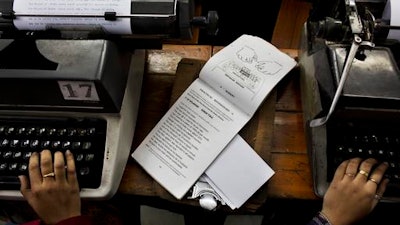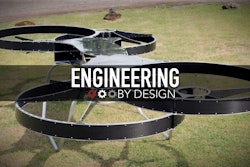
NEW DELHI (AP) — The end is coming, though admittedly it may not look that way at 10 a.m. on a Tuesday morning, when dozens of young Indians have arrived for morning classes at Anand Type, Shorthand and Keypunch College, and every battered Remington is clattering away.
Looking around the cramped classrooms, you might think that the typewriter still has a future in India. But in one of the last places in the world where it remains a part of everyday life, twilight is at hand.
Even Sunil Chawla will tell you that, and he's kept Chawla Typewriter going long after the profits disappeared.
"We thought this business would go on forever and ever," said Chawla, a courtly man whose father founded the family company nearly 60 years ago, but whose own sons chose to avoid the typewriter business. "I'll keep it alive as long as possible. But after me, I don't know what's going to happen. There's no future in this business."
For now, only one thing keeps him in the business: "I'm a typewriter man," he said. "I still have a soft spot for them, and I don't want to let it go."
Plus, people do continue to send him typewriters to fix, though most of his work these days is selling supplies for copiers and laminating machines.
India still has a few thousand remaining professional typists. There are a handful of typewriter repairmen and stores selling spare parts. There are typing schools that, at least occasionally, are jammed with students. There are long-outdated government regulations that, for now, help the typewriter cling to life.
But for how long?
"I come here only to pass the time," Satinder Kumar said on a recent afternoon at Tis Hizari, New Delhi's main court complex, where 50 or so typists earn a few dollars a day preparing rent agreements, sales contracts and other legal documents.
Kumar worked for 41 years at Tis Hizari, raising two children on his pay.
"It was such a good job. We were working from morning until night," he said, slouching in front of his manual Remington, a purple beret pulled down over his head to keep out the winter chill. "S.K. Kumar (typist)" it says on a hand-painted sign hanging above what counts as his office, a rusted metal desk in the complex's yard.
Now, there are just 10-15 pages a day for the hundreds of lawyers scurrying through the maze of buildings and corridors. At 15 rupees a page, or about 20 cents, that barely pays for transportation to work, typewriter ribbons and an occasional tuneup from the complex's last typewriter repairman. For the typists, things only get busy when all the computers are in use, or there's an electricity outage.
More than 20 years ago, Kumar realized that everything in the typing world would soon change dramatically. "The first time I saw the computer, I knew the typewriter would be finished one day," he said. On a computer, letters and legal forms can be re-used endlessly, requiring only changes in dates and names. Often, typists aren't needed at all. He laughs, but the bitterness is barely hidden: "Now the time has come!"
In hindsight, he says he probably should have learned how to use a computer. But the typing business remained pretty good until about 10 years ago, as computers grew cheaper and more widely available, so he never bothered.
Now, at age 65, he thinks it's probably too late. "I think it's time I left all this behind," he said.
Then he looked directly at me and squinted suspiciously: "Why are you asking all these questions about typewriters?"
It's a valid question. Technology changes constantly. Jobs die out regularly. Did journalists write about the decline of the video store rental clerk? Did we mourn the end of the LED watch?
But there's something different about the typewriter, which for more than a century was so important to how the world communicated. It was how presidents issued orders, how Hemingway wrote books, how reporters filed stories. Everything from painfully dull memos to deeply erotic love letters were crafted on typewriters.
In India, the typewriter was never just a piece of office equipment. It was a sign of education, of professional achievement, of women's growing independence as they slowly entered the workforce. It's been a Bollywood plot line and a symbol of nationalism ("The all-Indian Typewriter embodies the latest advances," read a 1950s advertisement for Bombay-based Godrej typewriters)
Even today it can be a path to success. In a country where government jobs have long been tickets to the middle class, thousands of Indians will sometimes apply for a single clerical position. And while most government offices have shifted to computers for typing tests, some still require a typewriter.
For Suresh Bansal, who for 40 years has managed and taught at Anand Type, Shorthand and Keypunch College, that's welcome news.
"You cannot look down at the keys while you type! This is the most important thing on the tests," Bansal said.
The school is little more than a few rooms in an old stone and brick building. Twenty years ago, every typewriter in the school would be in use almost constantly.
"One person would stand up and someone else would sit down," said Bansal, sitting beneath fluorescent tube lights in one of the two classrooms, his graying hair combed across his scalp.
Back then there were hundreds of little typing schools in New Delhi, crowded with university students, aspiring clerks and young women hoping for jobs as secretaries.
Around 2000, things started to slow down. India's economy was started to grow then, and computers no longer seemed impossibly expensive. First the foreign companies — Facit, Remington — closed their Indian operations. Then in 2009, the Indian firm Godrej and Boyce shut down the country's last typewriter production line. The world's few remaining typewriter manufacturers focus mostly on specialty lines, like clear plastic typewriters used in prisons to avoid smuggling.
Chawla's office, like his business, seems stuck in another time. There's a list of approved holidays on the bulletin board for 1983, a calendar from 1988. The rooms are piled high — sometimes higher than you can see — with old typewriters and metal keyboards and mysterious dusty boxes. He keeps it all, since spare parts are almost impossible to find anymore, and old typewriters are often cannibalized for their parts.
There's no computer in the office. Chawla has one at home, but feels there would be something disloyal about bringing it to the office.
He does all his work on a portable Godrej Prima. It's more than a decade old. It's in perfect condition.






















